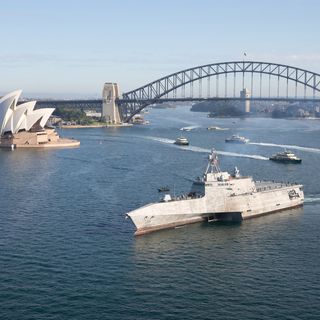The AUKUS nuclear-powered submarine partnership has now survived the bumpy inauguration of Donald Trump as US president. It has earned the endorsement of newly confirmed Secretary of State Marco Rubio and Secretary of Defense Pete Hegseth. It has also seemingly retained strong bipartisan congressional support. Now, the focus for Australia’s biggest and most ambitious defence capability project must turn back to delivery.
Delivering this project will require extensive industrial participation by Australia’s most populous state, New South Wales. For that to happen, the state government in Sydney needs to take measures to strongly promote it.
In Australia, the AUKUS submarine enterprise has been led by South Australia and Western Australia. The homeporting of Australia’s submarines in Western Australia and the construction of the new nuclear-powered AUKUS boats in South Australia give these states a highly visible role. The east coast states have been playing a back-seat role.
Yet, Prime Minster Anthony Albanese has billed AUKUS as a ‘nation-building’, rather than a two-state, effort. It will be a national endeavour on a scale rarely seen.
A new report by the United States Studies Centre and the McKell Institute finds that, without the economy, labour force and industrial heft of NSW, the AUKUS enterprise will stutter or fail. And without a more proactive stance, the jobs and investment associated with AUKUS could amount to a missed opportunity for NSW, Victoria and Queensland.
Without a more proactive stance, the jobs and investment associated with AUKUS could amount to a missed opportunity for NSW, Victoria and Queensland.
To date, public discussion of AUKUS has mainly contested the rationale behind the program. But we equally need a practical discussion of how AUKUS can be materially achieved and how the skills and jobs dividends can be unlocked.
One of the biggest lessons from US submarine construction has been the need to mobilise a national workforce to right-size the industrial base. As of 2023, US submarine prime contractor Electric Boat outsourced more than 1 million hours of work per year outside of its primary construction hall in Connecticut to different US states, the location of its local construction yards. Huntington Ingalls Industries, the other US submarine builder, was outsourcing 900,000 hours a year. The US Navy is looking to move to relying upon 5,000,000 total hours of outsourced work per year—or half of the hours needed to build one submarine.
The message is clear: relying solely on locally sourced labour, industrial capacity and supply chains for submarine construction is a recipe for failure.
In Australia, AUKUS’s success must depend on embracing the advanced manufacturing, industrial and workforce heartland of the east coast state with the largest economy.
The answer for scalable advanced manufacturing and workforce development in the AUKUS project should lie in New South Wales. The McKell Institute and the United States Studies Centre report revealed two key limitations on the opportunity at present.
First, it is clear that the NSW government has yet to pay enough attention to the AUKUS program and to prepare the state for the myriad of economic opportunities that the program promises.
This risks not only missed opportunities for NSW workers but also for the state government’s own policy ambitions.
The Labor state government of Premier Chris Minns made reviving domestic manufacturing a centrepiece of its 2023 election pitch. It wants to see more buses and trains and trams made in the state—a worthy goal, but a pricy one, and one that would be difficult to achieve at the scale required for a manufacturing revival.
Instead, the sector’s answer may be in the scale and timeframe of AUKUS.
Most importantly, NSW is uniquely placed to play a major role in AUKUS.
NSW is a powerhouse because of its scale, especially in manufacturing, training and education. It is home to 33 percent of the national labour force, compared with 6 percent and 11 percent for South Australia and Western Australia respectively. NSW has four times as many people employed in manufacturing as South Australia and three times as many as Western Australia. This is critical, because the AUKUS submarine enterprise will require an estimated 2000 suppliers, a huge swathe of national industrial capability.
But the AUKUS opportunity for NSW might be derailed by a second problem: NSW’s existing manufacturing sector is beginning to turn away from defence.
But the AUKUS opportunity for NSW might be derailed by a second problem: NSW’s existing manufacturing sector is beginning to turn away from defence. Though the state is home to 40 percent of the nation’s defence and aerospace industry and more than 80 defence facilities, industry, unions, suppliers and universities all report a lack of engagement, focus and incentives from the state government in this area.
Rapid action is required from the NSW and federal governments to ensure all states, including NSW, are plugged in to the AUKUS opportunity.
First, the NSW government should mirror Western Australia, South Australia and Queensland by standing up a dedicated body, which could be called Defence NSW, to coordinate both policy and outreach related to AUKUS. Nestling this function within the state agency Investment NSW contrasts with the organisational focus in other key AUKUS and defence-industry states. It limits the capacity for promoting and facilitating AUKUS, as Investment NSW must also attend to so many other activities.
Second, the state government should establish portfolio responsibilities for Defence Industry inside NSW cabinet, with a mandate to engage with the federal government, advocate for NSW, coordinate with other state ministries and ensure that the state’s policy settings, incentives and industrial settings are appropriate to facilitate NSW workers and industry’s contribution to the project.
Together, Defence NSW and the NSW defence industry minister could deliver reform, provide for stakeholder advocacy at federal and international levels, establish NSW as the manufacturing heartland and as a key recruitment, skills and training hub for the AUKUS enterprise. To provide strategic direction to these functions, as a matter of urgency, a comprehensive industry plan for NSW in AUKUS must be prepared.
These measures would put NSW workers and companies on the front foot in taking advantage of the opportunities available to the state with AUKUS. Such an approach in Australia’s other east coast states would render AUKUS a truly national industrial project and see it poised to deliver Australia’s national security objectives.








